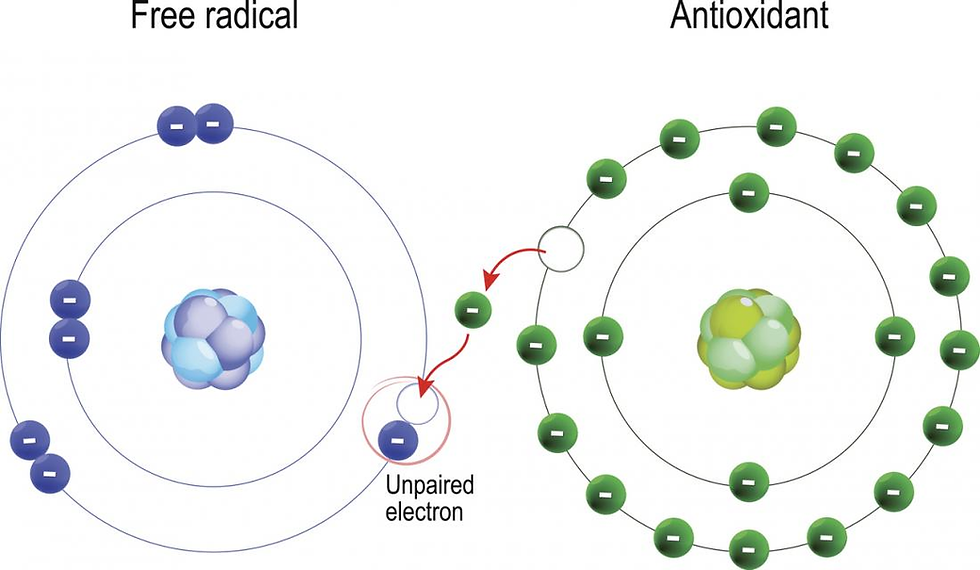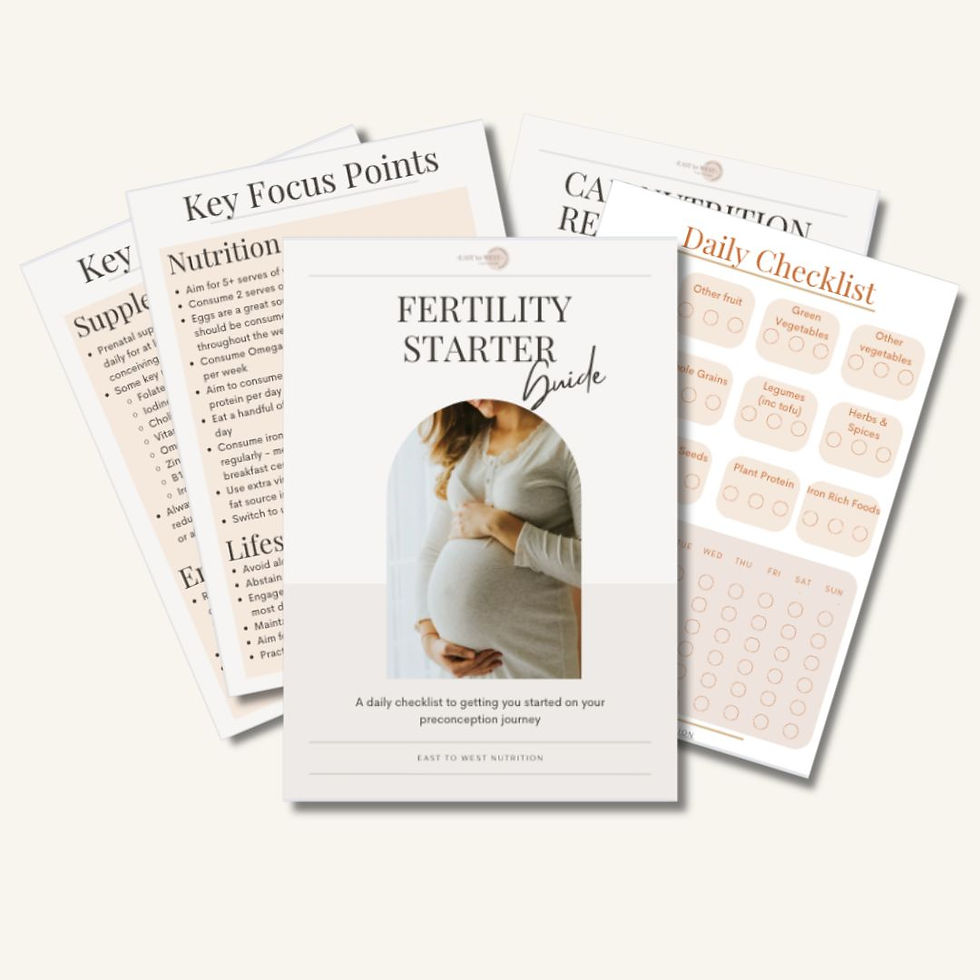Anti-Inflammatory Foods for Fertility
- Grace Armstrong
- Apr 10, 2023
- 4 min read
Updated: Aug 22, 2024
How does inflammation affect fertility, what foods reduce inflammation and boost fertility? Lets get into it...
Inflammation and Fertility

Inflammation is your body's natural response to infection, injury and illness- and in which case, it's a good thing. However, prolonged inflammation can lead to insulin resistance, underpin conditions such as endometriosis and PCOS and impact fertility outcomes.
In fact, inflammation causes oxidative stress (and vice-versa), which reduces significantly reduce egg and sperm quality, reduces implantation success and increases the risk of miscarriage. High levels of inflammation and oxidative stress were detected in up to 70% of women with unexplained infertility cases.
And it’s a similar story for men; an increase in circulating markers of inflammation and oxidative stress is seen in male factor infertility. This can impact sperm health across all parameters (count, motility and morphology) and lead to DNA fragmentation.
MASTER YOUR EGG QUALITY MASTERCLASS
...Regardless of age, AMH or fertility history
Diet is a huge way we can modify and reduce inflammation, many pro-inflammatory cytokines are produced in the gut, so it checks out that your diet largely impacts your body's inflammatory state.
Anyway, enough of that. Let's get into how we can reduce inflammation for fertility...
Foods that Reduce Inflammation and Improve Fertility Outcome

Oily Fish
Oily fish, such as salmon, mackerel, tuna, sardines, and shellfish, contain essential omega-3’s. Now, there are numerous forms of omega-3, fatty fish contains high amounts of eicosapentaenoic acid (EPA) and Docosahexaenoic Acid (DHA) which are more effective at reducing inflammation than alpha linolic acid (ALA)- which is typically found in plant sources. Research shows consuming these types of fish 2-3 times a week can have a significant effect on reducing inflammation within the body. Salmon in particular also contains a high amount of vitamin D, and low vitamin D is associated with poor fertility outcomes.
Hot tip: Canned salmon contains salmon bones (honestly you can’t tell) and vitamin D will aid in the absorption of calcium from the bones. Also, it’s a much more affordable option!
Extra Virgin Olive Oil

Extra virgin olive oil (EVOO) is often praised as the golden oil, and it’s no wonder, it's filled with numerous phenolic compounds and antioxidants which exert anti-inflammatory actions and reduce oxidative damage. It’s also high in vitamin E, a powerful antioxidant that is associated with improved sperm and egg quality. Antioxidants work by neutralising free radicals in the body which form for many reasons in our daily lives (through metabolic processes, our environment etc.). This process protects tissues from damage and prevents the inflammatory response from occurring in the first place.
To get a better understanding of the bioactive compounds available in EVOO (there’s honestly too many to mention) take a look at The Olive Wellness Institute
Vegetables and Fruit

Vegetables and fruit! I mean the more the merrier, eat the rainbow! They are filled with antioxidants, flavonoids, polyphenols and phytochemicals which reduce inflammation through various anti-inflammatory pathways. The key is to have a variety of sources, aim for 30+ different types per week to ensure you’re getting a full range of these magical compounds!
Some of the highest sources of antioxidants are artichokes, cabbage, asparagus, avocados, beetroot, berries and kiwis. Seasonal fruit and veg often contain a higher quantity of antioxidants.
Nuts & Seeds
Nuts & Seeds are filled with ALA omega-3, vitamins and minerals. While ALA isn’t as potent as DHA or even EPA, it still reduces inflammation. It’s important to note if fish/ shellfish isn't part of your diet and you are relying on nuts & seeds for your source of omega-3, supplementing with DHA/EPA may be beneficial (please speak to a professional before starting any supplements- contact me here).
Also, some nuts are rich in magnesium, l-arginine and vitamin E, which may also play a role in keeping inflammation under control. Some key nuts & seeds to include regularly are; almonds, brazil nuts, walnuts, chia seeds, hemp seeds, and flax seeds.

Herbs & Spices
Herbs & Spices- often forgotten about, but herbs and spices are packed full of rich antioxidants and have been used for centuries to treat inflammation. Fresh or dried is fine!
Some of my favourite ones are turmeric, ginger, garlic, cinnamon, and black pepper.
Hot tip- add pepper to turmeric to enhance the absorption of curcumin (active ingredient) by up to 2,000%.
Do you have a dream of becoming pregnant but you don't know where to start?
Book a free discovery call and see how I can support your journey to motherhood
Foods That Cause Inflammation
Before we wrap this up, it’s probably good to mention the foods which cause inflammation- you might have guessed it, highly processed foods which are high in saturated fats such as processed meats and trans fats such as fried foods and refined carbohydrates can promote pro-inflammatory cytokines and oxidative stress which increases inflammation and negatively impacts fertility.
Before you go, grab your FREEBIE!

The Fertility Starter Guide
An easy-to-action plan to get you started on your preconception journey
Subscribe and grab your copy for FREE



Comments